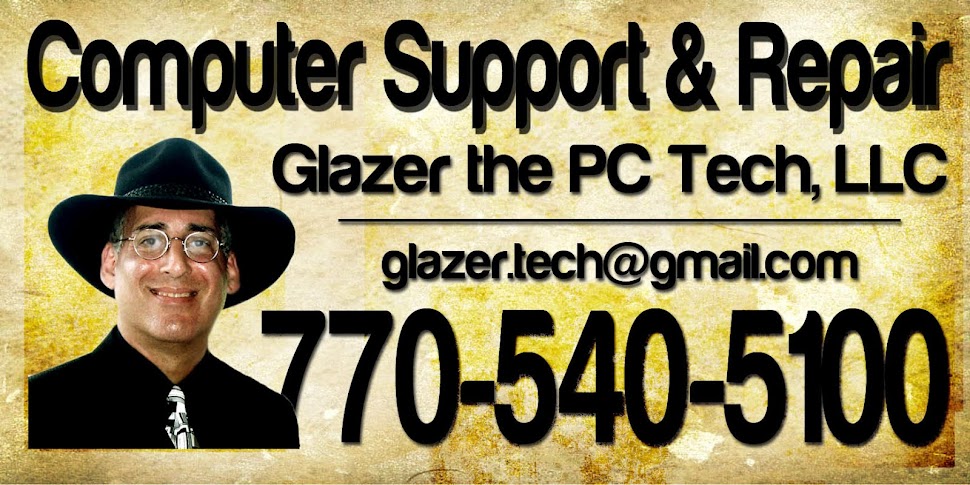
arthur@glazerthepctech.com
I got up from my computer last weekend to do some cleanup around the house and yard. I was arranging bikes, mowers and piles of empty boxes when it came to me. I realized I had as much garbage in my computer as I had in my garage. There were things I never used in both places and it was time for spring cleaning.
The empty boxes my external hard drives and monitors came in have been taking up valuable space I could be using for more important storage. It was time to prioritize. The same goes for the computer. There are lists of temporary files, old programs and large downloads I viewed once, a year ago. It was indeed time to take out the trash.
Sure you can do it manually if you know where to look, but most of us don’t. Fortunately there are programs that will do it for you. We’ll get to them in a minute.
Most browsers will offer to dump the old files after a session on the Internet. With Firefox, it’s as simple as clicking on Tools, then on Clear Private Data. There are more choices under the Options listing, then the Privacy tab.
In Internet Explorer choose Tools and find Internet Options. You’ll see various places there to delete old files. One of them is the history cache. For whatever reason, the default time is 30 days to keep your old sites. I would place it at no more than a week.
Keep in mind if you dump your cookies, (as opposed to tossing them) you may lose some passwords you have saved for some of your favorite Web sites. Some utilities allow you to pick and choose which ones to keep, but the browsers usually don’t, so tread lightly.
CCleaner (www.ccleaner.com) is a free program that attaches itself to your Recycle bin. A right-click will eradicate more than history and temp files. It takes out the trash, cleans old addresses, clipboard entries and more. It also finds and repairs issues in your Registry.
Webroot Window Washer (www.webroot.com/land/ww_clean.php?rc=4929) is a very thorough yet easy to use program. Not free at $29.99 but I found it online for $19.99 this week. It has lots of customizable options. It’s good with XP and Vista.
WinCleaner (www.wincleaner.com) is another good one and at the same price — again loaded with options. It is more of a cleaning suite in that it cleans temp files but also cleans shortcuts, tunes the registry, wipes your tracks, moves programs or uninstalls them. Also good with XP and Vista.
Another good free utility is Cleanup! available at www.stevengould.org. Look on the right side of the page for the link. CleanUp! is a powerful and easy-to-use application that removes temporary files created while surfing the Web, empties the Recycle Bin, deletes files from your temporary folders and more.
Some of these tools are more thorough than others. Some simply delete the temporary and history files while others wipe your tracks completely. Two strong ones are Privacy Eraser at www.privacyeraser.com and PC Confidential (www.PC-Confidential.com).
These elaborate programs offer the option of what is called a Pentagon wipe, rewriting your tracks many times over so nothing could read them. They’re good for the paranoid or if you really don’t want anyone to see where you have been online or what passwords or account numbers you’ve typed in. If you do online banking at home or watch online videos at work, it’s something you may want to consider.
These utilities and more like them can be found at Web sites such as download.com, majorgeeks.com, tucows.com, filehippo.com or downloads.zdnet.com. The downloads are free and many are free to use. There are other sites. You could always ‘Google’ whatever it is you’re looking for.
It is advisable to always know what you are erasing — you may inadvertently get rid of something your systems needs. With that in mind, here is a good practice to follow. Prior to making any changes to your system, whether adding something, changing or deleting it — create a system restore point first. (Look for System Restore in System Tools under Accessories). This way, should something go wrong, you could always revert back to that ‘safe’ point you created.
A system free of clutter will run faster, be more private and confidential. It will be easier to navigate — sort of like walking into a clean garage.
Arthur Glazer is a freelance writer and computer technician from Gainesville. He welcomes comments and questions.

No comments:
Post a Comment
Got a Comment - or a quick question...